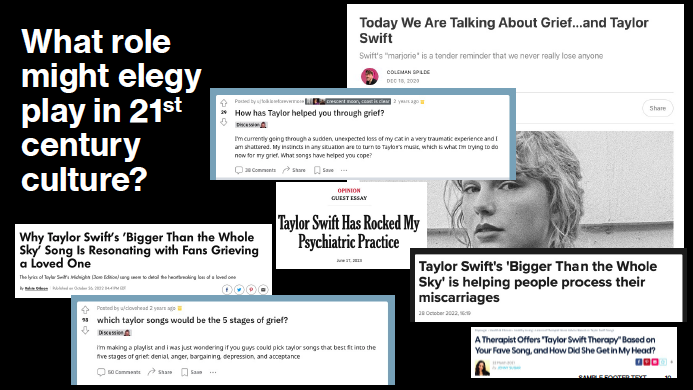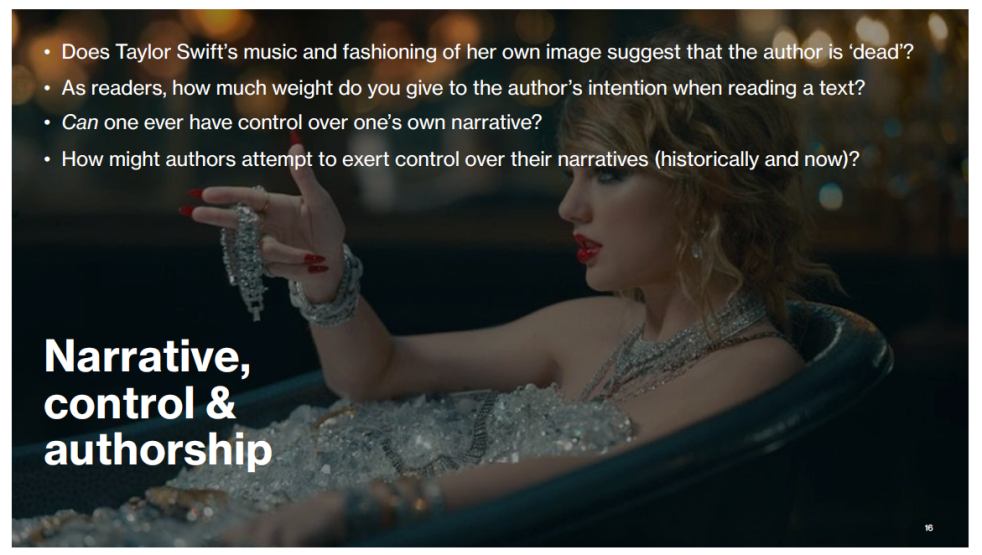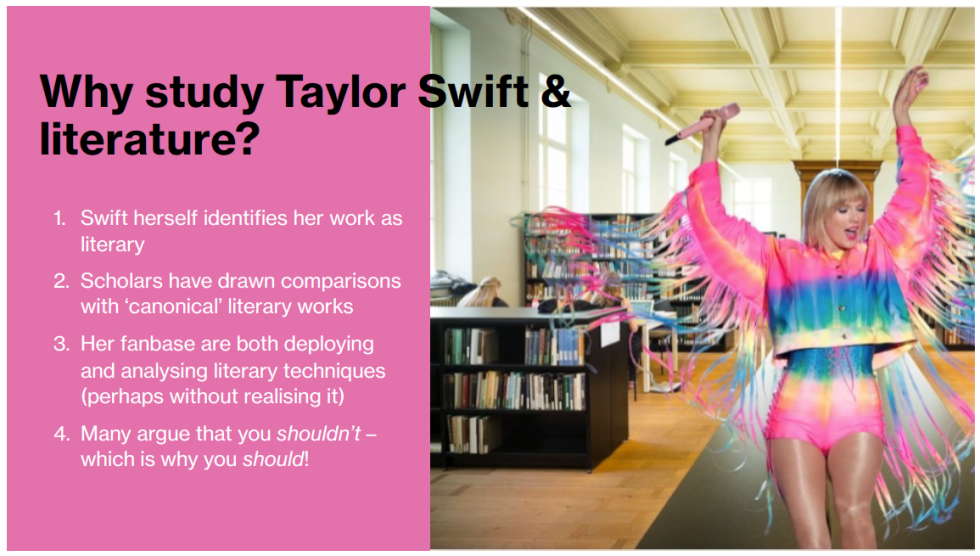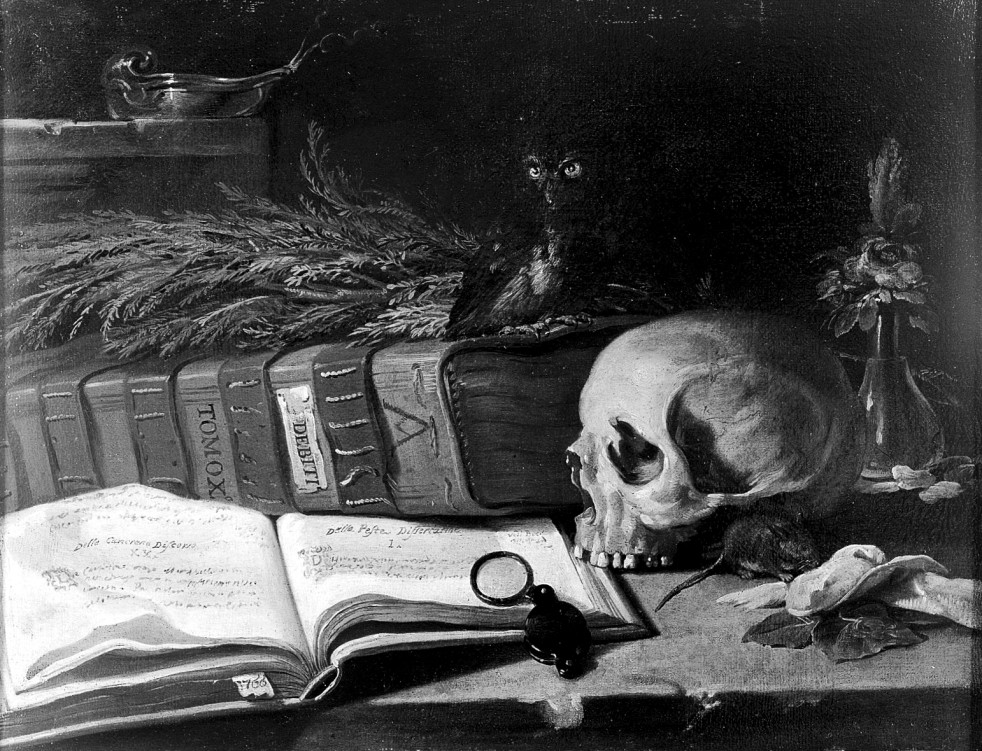What a semester it's been! Click above the image for more vital stats from our English Literature (Taylor's Version) classroom.
English Literature (Taylor’s Version): Seminar 6
[By Paulien Vercruysse] In seminar 6 of English Literature (Taylor’s Version), we focused on Romanticism, nature and ecocriticism, alongside Taylor Swift’s music. No less than five songs were on the agenda for this week and not one of them was unwelcome. The songs that we put under the microscope were ‘New Romantics’, ‘Out of the Woods’, ‘The Lakes’, ‘Ivy’ and ‘Willow’. The seminar was kicked off with a discussion of the songs. We tried to uncover what they were about, what role nature plays in them, and what striking images and oppositions we stumbled upon. [Click above image for more]
English Literature (Taylor’s Version): Seminar 5
In seminar 5, we explored the relationship between Swift's music ('Soon You'll Get Better'; 'Ronan'; 'Marjorie'; 'You're Losing Me'; 'Bigger Than the Whole Sky') and elegy, a capacious term that usually connotes a song or poem about death or bereavement, the tradition for which originated in ancient Greece. We looked at three very different examples of elegies: the anonymous 'The Wanderer', from the tenth century (originally written in Old English); Thomas Gray's 'Elegy Written in a Country Churchyard' from the eighteenth century; and Christina Rossetti's 'A Dirge' (nineteenth century). Focusing on these poems, we explored the relationship between language, memory and emotion. Later, we asked what role elegy might play in twenty-first-century culture, and looked at some of the fan responses to Swift's elegies, speculating that these might help to remove some of the taboos surrounding grief, death and bereavement and enable people to articulate their emotions in a cathartic and restorative way. [Click above image for notes]
Title Pages (Taylor’s Version)
This is why we can have nice things; or, what happens when students are tasked with making an eighteenth-century-style title page for a Taylor Swift song. [Click above image to see more]
English Literature (Taylor’s Version): Seminar 4
In Seminar 4 of English Literature (Taylor's Version), we looked at the relationship between writing, gender and power, asking what Taylor Swift can teach us about literary feminism. We listened to 'Right Where You Left Me', 'Dear John', 'Mad Woman', 'Hits Different' and 'The Man', asking: What construction(s) of femininity do we see in the song? What is the relationship between writing and power? Are there any literary allusions? Is this a 'feminist' song? if so, why? If not, why not? We used this discussion - also bringing in Swift's re-recording of her masters, seen by many as a feminist act - to segue into two important feminist literary texts: Mary Wollstonecraft's 'Vindication of the Rights of Woman' (1792) and Charlotte Perkins Gilman's The Yellow Wallpaper (1892). [Click above image to read more]
English Literature (Taylor’s Version): Seminar 3
[By Birgit de Schrijver] In the third seminar we looked at the role of the author. More specifically the influence of the author when it comes to our interpretation of certain texts (or songs). When looking at “Jabberwocky” by Lewis Carroll, we came across many nonsense words which made it difficult to understand the poem. However, this gave us a lot of freedom in interpreting it since there didn’t seem to be a right or wrong meaning. Where Jabberwocky gave us a lot of freedom, part of this was taken away by Carroll's “Through the Looking Glass”. Here, Humpty Dumpty gives us (sometimes confusing) explanations for the nonsense words. Unfortunately, by telling us what something means, we are deprived of our own interpretation. We discussed that often the explicit interpretation of the author limits the interpretation of the reader. [Click above image to read more]
English Literature (Taylor’s Version): Seminar 2
In English Literature (Taylor's Version) seminar 2 - titled 'This Ain't a Fairytale: Chivalry and the Knight in Shining Armour' - we looked at the anonymous 14th century poem Sir Gawain and the Green Knight, written in Middle English (though we used the excellent Simon Armitage poetic translation). Students had also watched the 2021 film The Green Knight - a very free adaptation of the poem by filmmaker David Lowery and starring Dev Patel - in advance of the seminar, and were asked to write either a short opinion piece on the film, or their thoughts on the idea of chivalry. [Click the above image to read more]
English Literature (Taylor’s Version): Seminar 1
In the first seminar of English Literature (Taylor's Version) at Ghent University, we looked at four reasons to study Taylor Swift's work alongside English literature. [Click the image above to read more.]
Baited hooks and silly books: why Taylor Swift is the new Gothic novel
‘Too many young women yearn for annihilation’, reads the clickbaity subtitle of Mary Harrington’s article ‘The Dark Truth about Taylor Swift’. Published on 16 August 2023, Harrington’s piece observes a troubling tendency in young women towards ‘a craving for romantic transcendence that’s difficult to distinguish from self-destruction’: in other words, an obsession with, and yearning for, love affairs made all the more intense by the knowledge that they are doomed to failure (such as Jack and Rose from Titanic, or Romeo and Juliet). Harrington attributes some of Swift’s popularity to the fact that her oeuvre satisfies this desire: her best songs are about romantic liaisons that don’t end well (‘got a history of stories ending sadly’). Harrington then goes on to link this to thirteenth-century France and the massacre of the Cathar sect of Christianity, who saw our incarnated world as fundamentally evil and longed to escape the ‘prison’ of flesh to return to unity with God. Following their persecution during the Albigensian Crusade, the Cathars’ beliefs went underground and spawned what we now know as ‘courtly love’ literature.
I Don’t Like Your Kingdom Keys: Literature, Gatekeeping, and the Classroom as Kindergarten
Well, this escalated. One minute I’m typing idle thoughts into a sticky note on my laptop about all the ways in which we might connect Taylor Swift songs with literature (and positing frivolous titles for such a course, like ‘Now I’ve Read All of the Books Beside Your Bed’); the next, I’m setting alarms for 3.30, 4.30, 5.30 and 7am so I can talk about this initiative to Dubai, Germany, Austria, Belgium, the US and Ireland, or rushing around trying to find a quiet corner in the middle of an American university campus where I can chat live to BBC News. Following segments on the Ukraine war and the Iran hijab protests with my chirpy musings on Swift (not Jonathan) and literature is one of the more surreal things I’ve done in my career.











